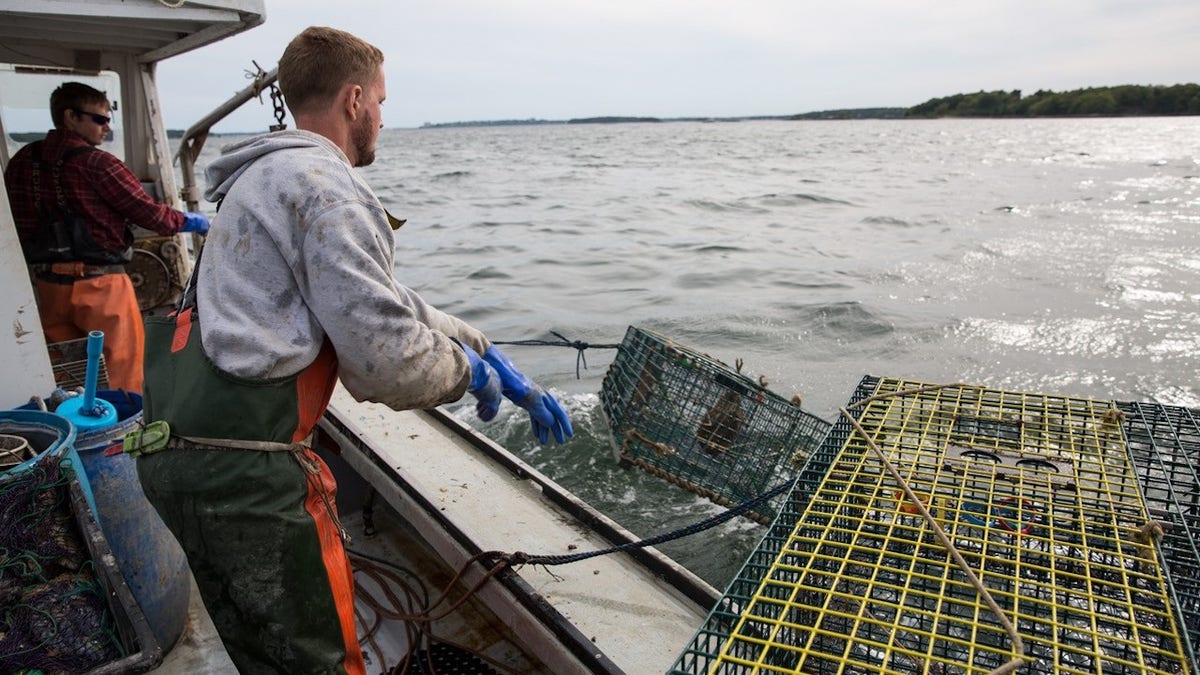Maine lobsterman warns growing environmental restrictions are 'devastating' industry
Fourth-generation lobsterman Dustin Delano reacts to green groups targeting lobster fishing with funds from dark money groups.
Far left activists are exploiting the recent death of an endangered whale to imperil the future of Maine’s iconic lobster fishery.
An endangered right whale recently washed ashore on Martha’s Vineyard entangled with Maine lobstering gear. It’s the first documented right whale fatality associated with our fishery, but so-called environmentalists are seizing the moment to call for consumer boycotts and new regulations that threaten the maritime communities that depend on Maine lobster.
Fishermen are the real stewards of the ocean. But cubicle environmentalists are scapegoating us for whale deaths and demanding that regulators retaliate against us owing to the recent entanglement.

Maine lobstermen haul in their latest catch off the state's coast. (Maine Lobstermens Association/Marketing Collaborative)
These organizations have poor command of the facts and no knowledge of our industry. Their agitating imperils our fishery and the working communities that depend on it.
Organizations like the National Resources Defense Council, the Conservation Law Foundation and others are exploiting this event to pressure regulators to impose new rules. These organizations are restless and can claim some success. A self-styled watchdog called Seafood Watch convinced Whole Foods to stop stocking Maine lobster products late in 2022.
Critically, regulators acknowledge that data respecting right whale entanglements and Maine’s lobster fishery are uncertain at best. A biological opinion from National Marine Fisheries Service (NMFS) on right whale interactions with our fishery forthrightly acknowledged this point – and that many regulations binding our industry are based on guesswork.
"Data are limited, so we are often forced to make assumptions to overcome the limits in [sic] our knowledge," the opinion reads.
MAINE GROUP SUES CALIFORNIA AQUARIUM FOR TELLING CUSTOMERS TO AVOID BUYING LOBSTER
This is no surprise. Many whale deaths go undetected. Even when whale deaths are identified, it is often impossible to assign a cause of death owing to decomposition.
When entanglements are documented, they can seldom be traced to particular countries or even particular types of gear. And in those rare instances when a right whale entanglement can be traced, the numbers show Canadian fishermen are disproportionately responsible.
A three-judge panel of the U.S. Court of Appeals for the D.C. Circuit cited all of these facts when it blocked a regulatory plan for Maine’s lobster fishery in 2023.
Given the uncertainties in the data, as well as the steps lobstermen undertake to protect whales, you would think the environmental NGOs would make more modest claims. But they are so hostile toward fishermen, and so wide of the facts, that many of NEFSA’s members are suspicious of their true motives.
GREEN GROUPS TARGETING BLUE-COLLAR LOBSTERMEN ARE LARGELY FUNDED BY DARK MONEY
These groups know little about the data and even less about lobstering. The industry-side solutions they suggest show the staggering distance between brahmin "environmentalists" and working people.
For example, the Conservation Law Foundation has long touted the benefits of ropeless traps, a catchall term for several kinds of technology.
While ropeless trap technology may one day be safe and commercially viable, as of this writing, I do not know a single lobsterman who could afford to make the transition.
Ropeless traps also have an unacceptably high rate of failure. I am confident in asserting that the overwhelming majority of Maine lobstermen oppose any such transition as a simple matter of dollars and cents.
MAINE LOBSTERMAN HEARS MYSTERIOUS CRIES FROM THE WATER THAT LEAD TO MIRACLE RESCUE
A ropeless trap regime will drive most lobstermen out of the fishery, clearing the water for a corporate takeover. I don’t know if these so-called environmentalists favor corporatizing the lobster fishery, but that is the future they will get.
These entities have no connection to our coastal communities – unless perhaps they own vacation houses up here – and it shows.
For our part, lobstermen have removed over 25,000 miles of line from the water. All of our gear is marked, ensuring any entanglement is attributable to our fishery. And we deploy weaker rope with weak link devices to head-off entanglements.
CLICK HERE FOR MORE FOX NEWS OPINION
Because of these measures, entanglements are rare. Right whale #5120 is just the second documented entanglement associated with our fishery since 2004, and the first fatality.
Maine’s lobster fishery is a model of sustainability. Our data-driven, preservation-minded practices have created an environmental and economic miracle. Wild lobster stocks are healthy and robust, while the lobster supply chain generates $1 billion for the state’s economy and supports thousands of jobs. We know what we’re doing.















































